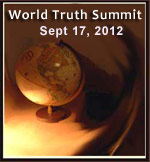
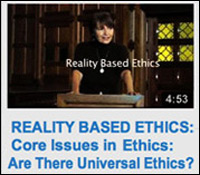
More Articles:
Diversity Issues
WHERE DO I STAND?
on UNIVERSAL ETHICS,
PERSONAL ETHICS,
and HUMAN RIGHTS
I call my ethics, "reality-based ethics." In other words, I don't start from principles. Instead, the start is people, reality. The question is: what do we need to flourish? Those things are our universal human rights.
In other words, my personal ethics are universal ethics - valid for all of us.
What are some of those things we need?
There's basic stuff like air, water, food.
Then, there's stuff like access to health care (body care) and education (mind care), to information (again, mind care), to physical integrity (body care), to explore and express (mind care).
To express. This includes the right
-
to question (nothing is off limits),
-
to make honest mistakes (no doctor is expected to be 100% right in diagnosis even with the best diagnostic tools),
-
to express unpleasant truths whether about a health issue (so a doctor must be allowed to express a painful reality, like a cancer diagnosis) or about a religion or political system or person,
- to express unpopular truths and viewpoints.
The common term for the freedom of expression is freedom of speech.
Another essential freedom, in these reality-based universal ethics, is the right to self determination - freedom to choose how we live our lives, as long as this does not physically harm others.
The basic principle is liberty until harm - not because this is some abstract principle, but because this is what we need to flourish. In the United States constitution, there is a similar (but more limited) right, the right to pursue happiness. I find that that right is not enough. To flourish we need to be able to pursue much more than happiness.
But now, to get back to liberty until harm (the wording, and the following thoughts, are thanks to John Stuart Mills, a brilliant 19th century thinker). Harm does not include hurt or offended feelings.
So there is the liberty to express unpopular viewpoints, even if people claim they are offended, and even if they actually are offended.
But there is no liberty to express a viewpoint, popular or not, that incites harm to others. That violates these reality-based universal ethics.
In other words, passages in the Qu'ran such as "Fight and kill the disbelievers wherever you find them, take them captive, harass them, lie in wait and ambush them using every stratagem of war." (Qur'an:9:5) are not acceptable.
Saying that one finds such passages unacceptable, even if some people are offended by our saying this, is ethically fine. One is not inciting harm. Instead one is saying something very reasonable, that passages that incite harm are unacceptable.
In places where hate speech is barred, it would certainly be interesting to ask - perhaps even in a court of law - that such passages be prohibited. Of course, people would still have access. But it would stir quite a controversy - perhaps especially among people who claim every religion is the same. (This might be akin to, in the 1970's, the first prosecutions of date rape as rape.)
Actually, I'm not interested in prohibiting these passages. I would like general awareness of their existence - especially every time an Islamic group tries to silence any negative remark about Islam, attempting to stifle freedom of speech and of knowledge.
By the way, the same standard - liberty until harm - of course holds for all religious and non-religious texts.
Should someone claim that "liberty until harm, and only until harm" violates the right to freedom of religion, the answer is clear. Freedom of religion is not an absolute freedom. If a religion asks for, say, the killing of the first born at birth, this would not be considered acceptable - or even legal.
There are priorities. The right to stay alive and be safe is above the right to do whatever one wants as long as one has a religion that claims this is justified.
Inciting harm, in the name of religion or anything else, is not permissible.
If someone is offended by this, one might ask: what inner barriers does this person have against hearing truths they do not want to hear? Or is the person in fact just trying to bully others into silence?
Now back to the right to freedom to self determination, the right to live lives of our own choosing. This includes:
-
the freedom to stay with or leave our families,
- the right to love as is right for us,
-
the freedom to choose our love partners,
- the freedom to have birth control,
-
the freedom to choose our religion or to not belong to any religion,
-
the freedom to choose the work we do (within the limits of our abilities and of what is available in our society).
Such freedom means
there can be no barriers based on things like gender, race, sexual orientation, caste, etc. Such barriers block our right to flourish.
There's something crucial I haven't mentioned yet: the right to safety. It's only in safety that we can really flourish - feel and express our emotions, explore the ideas of others and our own, go further.
My childhood heroines all had a place of special safety - a strongly supportive and encouraging family. Helen Keller, Clara Barton, Elizabeth Blackwell - all three had parents who gave them tremendous support and encouragement.
My childhood heroines bring me to something else important - role models, heroes and heroines - sometimes from family, teachers,
friends, sometimes from stories.
A safe enough larger environment is also vital to the majority of people. For example, an environment with hard drugs or addiction (drug and/or alcohol and/or gambling)
isn't conducive to flourishing.
Nor is an environment which teaches us to fear questioning what we are taught - punishment by hellfire or here-and-now punishment, for instance.
Financial safety is also important - that savings are not wiped out, for instance.
Some people will make it despite a lack of safety. There have been studies done on resilient children - about 10% of those brought up in extremely difficult circumstances. But most people lack that resilience - and flourishing is not meant to be just for the most resilient.
We also need limits, boundaries, in order to flourish. Others do not have the right to harm us. And if we want to harm, we need to be stopped as well. I'm remembering seeing a four-year-old who had hit his two-year-old sister with a small stick. His mother took his sister in her arms, took the stick and broke it, and then spent the next half hour comforting the little girl and talking with her son. So he was stopped, and it was clear he was not to do again what he had done.
I could go on. But this isn't intended to be a full exploration of reality-based ethics. It is enough to give you a good idea of where I stand, and why I hold this position.
I've left out so much, in fact - such as that, personally, many of my actions come from an ethics of care, rather than from any principle that someone has the right to flourish. It often viscerally hurts me - because I care - when I see harm happening.
A general stance: I hold that there is a universal ethics, a universally valid ethical standard. What is right for one person is right for another. I don't mean we all need to do the same thing. Not everyone needs to write poetry to flourish.
But reality-based ethics are not subjective, relative: "Who am I to say what is right for someone else, especially in another culture?"
My parents, when they emigrated to Canada, were appalled at the low status of women, that my mother was paid half of what a man was for doing the same work, that my father had to sign for a credit card for her though she had a job, etc. In other words, they upheld that women universally had the right to the same pay as a man if she did the same work, etc.
Who are we to say what is right or wrong? We can look at human beings, and see what we need to flourish.
So these are not just my personal ethics, but universal ethics, universal ethical standards, that uphold universal human rights including freedom of speech. Plus, there is the ethics of care, a very powerful motivating factor.
In the teleseminar series, I've cared to give space to more than one viewpoint on Islam and the West, more than one evaluation of the situation, more than one proposed solution to the current encroachments on universal human rights, like freedom of speech, in the West.
I have, for instance,
-
a devout moderate Muslim who holds that the hateful passages in Islamic religious texts are later additions,
-
and someone who holds that the evidence suggests that Muhammad never existed.
But there is common ground.
The common denominator is a strong human rights position, the acceptance of these as part of universal ethics. Everyone agrees - I hope so anyway, as there are things I don't know about the people I'm interviewing - with what I hold are universal human rights (equality of women and men, people of all races and sexual orientations, prohibition against violence in religion, etc). In my words, we all believe in reality-based universal ethics that uphold our right to flourish.
**
By the way, I realize that, in this exploration, I've just looked at one side of things: what we need from the world outside. There is the other side: what we need to develop in ourselves, and things we need to do.
Qualities like empathy and the capacity for good thinking spring to mind. The capacity to love. The capacity to act - even if there is fear. I will leave this side of things for now - but it's clearly as important as what we need from outside ourselves.
Elsa
I will end with more than one signature. I will give my formal signature, with my academic credentials. I'm proud of those credentials - lots of hard work, researching, thinking creatively, putting things together. Then I'll give my fun credentials, which you can find on The Idea Emporium.
By the way, my history includes teaching ethics,
a vital and fascinating subject.
I was often the only one in the class who started
with a belief in universal ethics, in universal
human rights.
I was initially stunned that almost all my students,
except for the traditionally religious,
believed in personal subjective relative ethics.
PhD
Psychology, Sociology, Literary Studies
a.k.a.
"Doc," or Dr Zee,
for good thinking from A to Z
Good thinkers of the world unite!
We have nothing to lose but our frustration
Core Issues in Ethics.
Are there universal ethics,
universal human rights
like freedom of speech?
Or is it all subjective personal ethics?
Then, the ethics of care. How to they fit?
Here, a teleseminar series -
interviews with 21 people
who are exploring the West and Islam,
and speaking out about their findings.

PARTICIPANTS
Robert Spencer
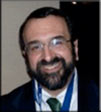
Bill Warner

Jonathan
Hausman
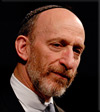
Narain Kataria
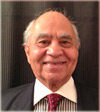
Elaine Black

Chris Logan

Andrew Harrod

Tamar Yonah

2012-2013




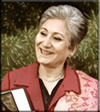

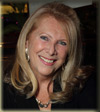






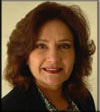





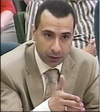


top of page
concept, design, interviews
copyright © Elsa, 2012-2022 - all rights reserved
All content of this website is copyrighted.
Do not republish without author's consent.

